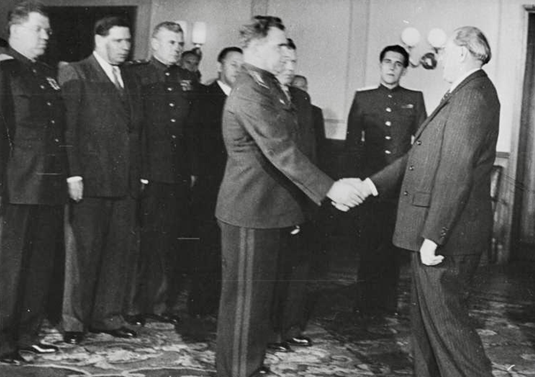Leadership Beyond the Battlefield: Chuikov’s Promotions and Postwar Influence
- Maria A. Kithcart

- May 24, 2025
- 3 min read

Pictured: General of the Army V.I. Chuikov and Ambassador Vladimir Semyonov at the founding of East Germany in Berlin, 7 Oct 1949 (German Federal Archives).
Promotions play a crucial role in fostering employee motivation and driving organizational success. They represent a formal acknowledgment of an individual’s performance, dedication, and readiness to handle greater responsibilities. For employees, receiving a promotion often leads to increased confidence, improved job satisfaction, and a stronger sense of loyalty. These advancements typically come with enhanced responsibilities, better compensation, and a more influential role within the organization, creating a ripple effect that inspires others to strive for professional growth.
From an organizational standpoint, promoting from within helps cultivate a knowledgeable and committed workforce. Employees who are already familiar with the company’s culture, systems, and strategic goals can transition more smoothly into new roles, reducing both onboarding time and the costs associated with external recruitment. This concept also applies in a military context. Within the Red Army during the Soviet era, promotions were influenced by a complex blend of military merit and political loyalty. While battlefield accomplishments—such as courage under fire, strong leadership, and tactical effectiveness—were critical for advancement, they were often not sufficient on their own. Political reliability, demonstrated through active membership in the Communist Party and strict adherence to Soviet ideology, was equally, if not more, important in determining an officer’s eligibility for promotion.
Following the end of the Great Patriotic War, Chuikov remained in command of the 8th Guards Army, stationed in Germany, until July 1946. During this period, he also served as the head of the Soviet military administration in Thuringia (in a military governor role). Vasily Ivanovich's military career continued to ascend as he was entrusted with significant leadership responsibilities in post-war Europe. His battlefield accomplishments, particularly at Stalingrad and during the final assault on Berlin, solidified his reputation as a capable and loyal commander within the Soviet military hierarchy. These achievements, coupled with his political reliability, positioned him for a series of key promotions and strategic appointments in the early Cold War era. His expertise in both military operations and administrative control made him an ideal choice for managing Soviet interests in occupied Germany. This period marked a new chapter in Chuikov's career, as he transitioned from front-line military leadership to overseeing political and military authority in Eastern Europe.
Starting in July 1946, Colonel-General Chuikov served as Deputy, and later First Deputy, Commander-in-Chief of the Group of Soviet Occupation Forces in Germany, as well as Deputy Chief of the Soviet Military Administration in Germany. In 1948, he was promoted to a 4-star General rank (General of the Army). The following year, in March 1949, he was appointed Commander-in-Chief of the Group of Soviet Occupation Forces. During this time, and up until October 1949, he also led the Soviet Military Administration in Germany (SMAG), which directly governed the Soviet Occupation Zone. Following the establishment of the German Democratic Republic in October 1949, Chuikov became Chairman of the Soviet Control Commission (SKK), the body responsible for overseeing Soviet authority in East Germany.
In her biographical article, Alexandra Maximova writes the following:
“Chuikov's period of work in Germany coincided with the difficult times of the Berlin crisis of 1948-1949 (the blockade by Soviet troops of the communication routes for the Western allies passing through the territory of East Germany to West Berlin). It was then that his diplomatic skills became apparent - he was able to make a significant contribution to the resolution of the conflict, balancing between Moscow's tough demands and the need to maintain stability in the zone of Soviet influence.”
In summary, promotions serve as powerful instruments of recognition, growth, and strategic alignment—whether in civilian organizations or military structures. They motivate individuals, foster loyalty, and ensure that leadership roles are filled by those with proven competence and institutional knowledge. The career of Marshal Chuikov exemplifies how promotions can reflect both professional excellence and alignment with broader organizational or political goals. His rise through the ranks of the Red Army during and after World War II illustrates the importance of both battlefield effectiveness and political loyalty in the Soviet system. More than just a decorated war hero, Chuikov became a key figure in managing Soviet influence during the early Cold War, leveraging his leadership and diplomatic skills to shape postwar Europe. His story underscores how promotions are not just personal milestones but pivotal decisions that influence the direction and stability of entire institutions.



